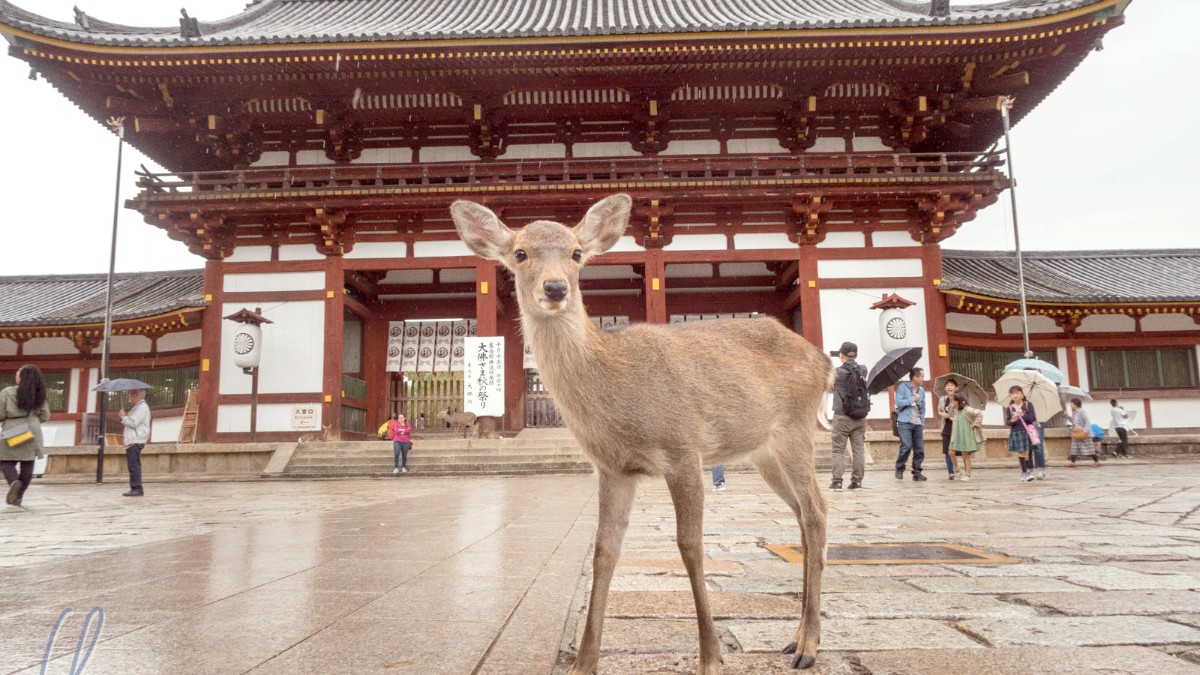
Kansai, Japan
Nara experiences four distinct seasons, each with its own charm. Spring (March to May) offers mild temperatures and pleasant weather. Summer (June to August) brings hot and humid conditions, especially in July and August. The rainy season typically lasts from June to early July.
Autumn (September to November) presents mild and clear weather. Winter (December to February) makes Nara cold but often sunny, with light snowfall possible.
Your travel dates influence crowd levels and prices. High seasons bring more visitors and higher costs, while low seasons offer a quieter experience.
Cherry blossom season (late March to early April) and autumn leaves season (late October to early December) are peak times, featuring stunning scenery but also large crowds and higher accommodation prices. Shoulder seasons like early March and mid-December present fewer crowds and pleasant weather. Summer (June-August) and winter (January-February) are low seasons, with fewer international tourists but varying weather conditions.
Late March-Early April & Late Oct-Early Dec
Stunning scenery, pleasant weather (blossoms/foliage).
Large crowds, higher prices, advance booking needed.
March & Mid-December
Fewer crowds, pleasant to cool weather.
Some chill in early spring, limited attraction hours in late autumn.
June-August & January-February
Least crowded, often clearer skies in winter, summer festivals.
Hot and humid summer, rainy season, cold winter, shorter daylight.
Typhoons occur mainly from late summer to early autumn (August to September), bringing heavy rain and strong winds. Monitor weather forecasts during these months. Nara summers feel hot and humid. Winters are cold, especially mornings and evenings. Plan your clothing accordingly.
For cherry blossom viewing, late March to early April offers the best display. Deer interaction is possible year-round, with less crowded and more relaxed deer in shoulder or low seasons. Hiking Mt. Wakakusa is best in spring or autumn, with comfortable temperatures.
An annual mountain burning festival in January.
A Buddhist repentance ritual held in March.
Two annual festivals in February and August, illuminating thousands of lanterns.
A traditional Buddhist event honoring ancestors, with various local celebrations.
Temples and shrines hold special events; a major travel period for locals.
Japan extends visa exemptions for many nationalities. Always confirm your specific needs well before travel.
Most tourists visit Japan with a Short-term Stay visa, allowing up to 90 days for tourism, visiting relatives, or business meetings.
Upon arrival, have these documents ready for a smooth entry process.
Consider specialized insurance for broader coverage during your trip.
Japan uses the Japanese Yen (JPY, ¥). Nara offers options for every budget, from frugal travelers to those seeking luxury. Cash remains important, alongside credit cards and IC cards.
The official currency is the Japanese Yen (JPY, ¥). Exchange currency at major airports, international banks, or some hotels. ATMs at post offices and 7-Eleven convenience stores are widely available and accept international cards for cash withdrawals, often the most convenient options.
Credit cards (Visa, MasterCard, American Express, JCB) are widely accepted in hotels, major restaurants, and department stores. Cash is important for smaller shops, some local restaurants, and certain local transport options. IC cards like ICOCA, Suica, and Pasmo are widely used for public transport and accepted at many shops and vending machines. Acquiring an IC card simplifies transactions.
Daily estimate: ¥5,000 - ¥11,000. This includes hostel dorms, convenience store meals, local bus use, and free attractions.
Hostel dorms or guesthouses (¥3,000-¥6,000 per night).
Limited dining choices, minimal taxi usage.
Daily estimate: ¥12,500 - ¥25,000. This covers business hotels, mid-range restaurants, and entry to multiple temples/museums.
Business/mid-range hotels (¥8,000-¥15,000 per night).
Occasional taxi use, but public transport dominates.
Daily estimate: ¥31,500 - ¥78,000+. This includes luxury hotels/ryokan, fine dining, and private transfers.
Luxury hotels/ryokan (¥20,000-¥50,000+ per night).
Higher costs for exclusive experiences and private transport.
| Category | Budget | Mid-Range to Luxury |
|---|---|---|
| Accommodation (per night) | ¥3,000 - ¥6,000 (hostel/guesthouse) | ¥8,000 - ¥50,000+ (hotel/ryokan) |
| Meals (per person) | ¥300 - ¥1,500 (street food/budget eatery) | ¥1,500 - ¥20,000+ (mid-range to fine dining) |
| Attractions (per entry) | ¥0 - ¥600 (free park/Todai-ji) | ¥500 - ¥1,200+ (museums/gardens) |
Japan boasts a very safe environment.
No specific vaccinations are required for entry. Consult a healthcare professional for routine and recommended vaccinations (e.g., Hepatitis A & B, Japanese Encephalitis for rural visits).
Heatstroke (summer): Stay hydrated, seek shade, use air conditioning. Common cold/flu: Practice good hand hygiene, consider a mask in crowds.
Tap water is safe to drink. Food hygiene standards are very high, including street food.
Japan maintains a high standard of medical care.
English-speaking doctors might be limited outside major cities like Osaka or Kyoto, though some are available in Nara. Travel insurance for medical emergencies is highly recommended.
Major facilities in Nara include Nara Medical University Hospital and Nara Prefectural General Medical Center. These institutions are well-equipped to handle various medical needs.
Always have your travel insurance details readily available.
Dial 119 for medical emergencies or fires.
Dial 110 for police assistance or crime reporting.
050-3816-2787 (24/7, English, Chinese, Korean for tourist info or emergencies).
Japan presents one of the lowest crime rates globally. Nara is a very safe city, but some local specifics deserve attention.
Japan experiences natural events.
Japan is earthquake-prone. Most are minor. The "J-Alert" system sends push notifications. Familiarize yourself with emergency exits.
Occur mainly August-September. They cause heavy rain and travel disruptions. Monitor forecasts closely if traveling then.
Highly recommended for medical emergencies, trip cancellations, lost luggage. Check policy for specific activities.